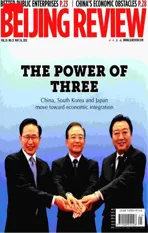The Right Move
2012-12-21
The Right Move
The recent summit meeting between China, Japan and South Korea, attended respectively by Premier Wen Jiabao, Prime Minister Yoshihiko Noda, and President Lee Myung-bak, was noted for a series of agreements ranging from investment promotion to enhancing cultural exchanges and strengthening agricultural and environmental cooperation.
One of the most significant gains of the summit, according to some Chinese and foreign analysts, is a decision reached by the three state leaders to start talks on launching a Free Trade Area (FTA) within the year. It has been observed that once such an FTA comes into existence, closer economic partnership would be built, freer trade would be practiced, and greater integration would be realized across the region.
The three East Asian countries have seen their economic and trade ties grow by leaps and bounds over the past decade. According to a newly released Chinese Foreign Ministry white paper, regional trade between the three countries grew to $690 billion last year, up from $130 billion in 1999. For years running, China has remained the biggest trade partner for both of its neighbors. The region’s economic strength as a whole also measures up significantly on a global scale. Official statistics show trilateral trade accounted for 18.5 percent of the world total in 2010, while their combined contribution represented almost 20 percent of the global GDP.
In addition to further invigorating regional economic development, the proposed FTA would benefit all three countries in terms of regional resource allocation and economic complementation. For instance, by absorbing new technologies from Japan and South Korea, China may speed up its industrial upgrading process, while Japan and South Korea may be aided in their industrial transfers and gaining greater market shares in the region.
Despite their relatively strong economic relations, major differences and disputes remain between the three nations due to historical factors and current political situations in East Asia. These include various territorial disputes, Japan’s denial of its World War II atrocities, and the nuclear issues on the Korean Peninsula, each concerning vital interests and sovereignty that cannot be resolved overnight. Under these circumstances, it is perhaps in the best interest of all to put aside these thorny problems, step up communication and consultation, build up trust with each other, and try as much as possible to seek mutually beneficial cooperation. The annual summit mechanism that was launched in 2008, and the proposed FTA, are thus the right move.
